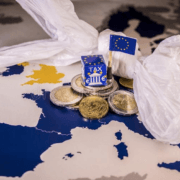
Amsterdam, 8 June 2018 – Plastic can cause cancer, heart disease and Alzheimer’s
Chemicals in plastic can cause cancer, heart disease, Alzheimer’s, dementia, Parkinson’s, arthritis, impotency and even harm babies in the womb.
Scientific evidence is piling up. It’s becoming impossible to ignore, inevitably pointing in the same direction. Plastic is everywhere: plastic particles, nanoplastics, microplastics are in food, drinks (tap water and bottled water) and in the air we breathe. For example, from the wear from car tyres in the air and microfibres from synthetic clothes. Cosmetics also contain plastic: lipstick, mascara, nail polish, anti-aging cream… The list goes on and on and on.
Enough is enough
Today on World Oceans Day, the Plastic Soup Foundation (PSF) is launching a new highly visual campaign. Emotive and hard-hitting. The main visual of the campaign is a human baby, except it’s a human baby made from plastic waste dumped in the oceans. The plastic human baby is a symbol. If we don’t act now, we are passing on our plastic waste problems. Literally poisoning future generations.
Not enough is known about the adverse health effects of plastic on the human body. That is why the Plastic Soup Foundation calls on companies and governments to initiate and fund more scientific research. To provide answers and protect people from the harmful effects of plastic.
What the scientists say
One of the leading environmental researchers over the last three decades is Dr Susan Shaw, Professor of Environmental Health Sciences at the State University of New York.
“There is an urgent need to understand how toxic chemicals, plastics, global warming are affecting the environment and human health. This is the frontier, the moral imperative of science today that can sustain life in the future.”
Dr Shaw has pioneered research into ocean pollution, oil spills, plastics, and climate change. This research is recognized by the global scientific community and has influenced public policy. She is renowned as a researcher for diving into the Gulf of Mexico oil slick following the 2010 BP Deepwater Horizon disaster. She considers plastic pollution as the biggest oil slick of all time, because oil is the main source of plastic.
Dr Heather Leslie, Senior Researcher at the Department of Environment and Health at VU University, Amsterdam agrees.
“The hazards of plastic particles for humans are slowly emerging from a number of studies. Plastic debris is a notorious marine issue, but it should now be recognized as a human health issue as well.”
Not just a problem, also a solution
The Plastic Soup Foundation isn’t just raising awareness of the global health problems caused by plastic. PSF offers solutions. PSF wants to change the way people use plastic. Not by stopping plastic use, but by starting a plastic diet.
What is a plastic diet?
Maria Westerbos, Director and Founder of the PSF, is currently in New York for World Oceans Day, initiated by the United Nations.
“We can all consume less plastic. As individuals. As a family. In business. On a national and international level. At startplasticdiet.org we offer advice and tips so that everyone and every company can cut down on plastic use. By using less plastic bags (obviously). By bringing your own coffee cup to the local takeaway coffee shop. By not chewing gum (it’s full of plastic). Every little bit less plastic helps. Just by thinking about using less plastic will make already a real difference. The plastic diet is a movement. A revolution. The whole world must go on a plastic diet.”
Plastic Diet Ambassadors
The PSF health campaign will be supported by ambassadors including famous DJ/producer Oliver Heldens and Olympic surfing gold medallist, Dorian van Rijsselberghe.
The Plastic Soup Foundation
The Plastic Diet is an initiative from the Plastic Soup Foundation. Set up in 2011 with a simple mission: NO PLASTIC WASTE IN OUR WATER!
Instead of taking plastic waste out of the water, we tackle the problem at its source. Through awareness campaigns, education programmes and working together with businesses, universities and other NGOs. To reduce and prevent unnecessary plastic use. And stop plastic ending up in the environment.
For more scientific background you can read our position paper: Plastic and Human Health alarming evidence.






